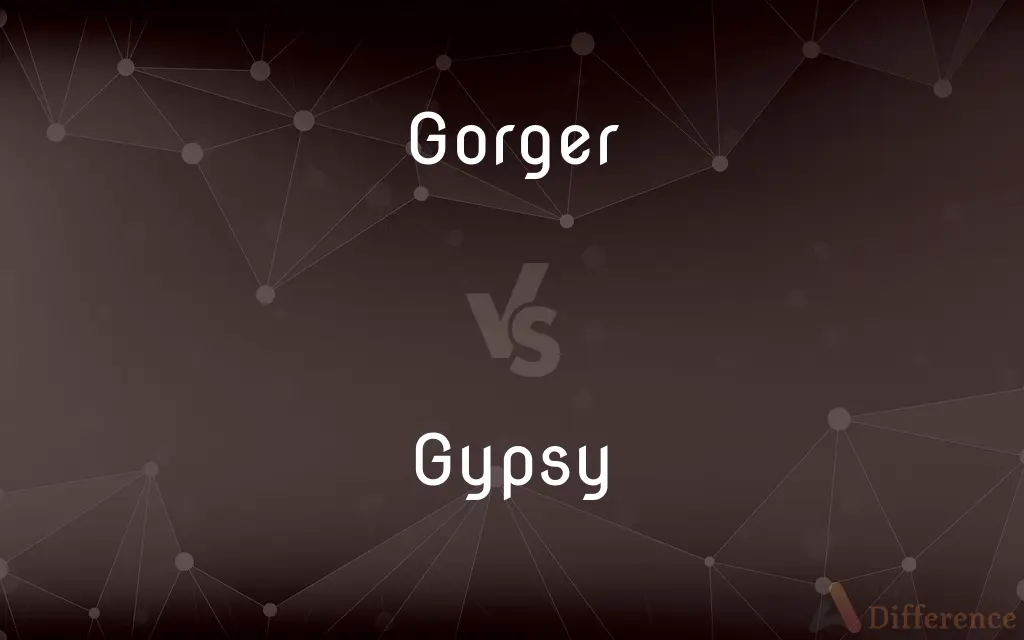Gorger vs. Gypsy — What's the Difference?
By Tayyaba Rehman — Updated on October 25, 2023
A "Gorger" is someone not belonging to the Romani or Traveler communities, often used by Gypsies to describe non-Gypsies. "Gypsy" refers to the Romani people, a distinct ethnic and cultural group with origins in northern India.

Difference Between Gorger and Gypsy
Table of Contents
ADVERTISEMENT
Key Differences
"Gorger" and "Gypsy" are terms that define distinct social and cultural identities. The term "Gorger" is primarily used within the Gypsy and Traveler communities to refer to someone who does not belong to these communities. Essentially, for a Gypsy, anyone outside of their community, particularly those who lead a sedentary lifestyle, might be called a Gorger.
On the other hand, "Gypsy" is a term that denotes the Romani people, an ethnic group that traces its origins back to northern India. Over centuries, the Romani have migrated across various parts of Europe and later to the Americas. Gypsies have their own languages, traditions, and customs, making them a unique and distinct cultural group.
However, it's essential to note that the term "Gypsy" can be considered derogatory to some Romani people, as it has been used pejoratively in the past. Many Romani prefer to be identified by their specific subgroup or simply as "Romani." In contrast, "Gorger" is a term less known outside the Gypsy and Traveler communities and is specific to the English lexicon of these groups.
While both "Gorger" and "Gypsy" serve to differentiate between those inside and outside the Romani or Traveler communities, their usage and implications vary. A "Gorger" signifies someone from the mainstream, settled society, whereas "Gypsy" encapsulates a rich tapestry of history, migration, and culture.
Comparison Chart
Definition
A non-Gypsy, often from settled society
A member of the Romani people
ADVERTISEMENT
Origins of Term
English lexicon of Gypsies/Travelers
Derived from "Egyptian" due to a mistaken origin theory
Cultural Implication
Outside Romani/Traveler communities
Represents Romani culture and heritage
Usage
Specific to Gypsy/Traveler lexicon
Wider usage but can be seen as derogatory
Association
Sedentary lifestyle
Nomadic heritage and distinct culture
Compare with Definitions
Gorger
Someone from the mainstream, settled society
Gorgers often don't understand the nomadic lifestyle of Travelers.
Gypsy
A member of the Romani people
The Gypsy caravan moved from town to town.
Gorger
Non-nomadic individual
Living in a house made her feel like a Gorger.
Gypsy
Related to the traditional practices of the Romani
He followed Gypsy customs in his daily life.
Gorger
An outsider to the Traveler communities
He felt like a Gorger when visiting the Traveler camp for the first time.
Gypsy
Someone with a nomadic lifestyle
His Gypsy spirit took him to many countries.
Gorger
Not adhering to Gypsy traditions
Despite being born into a Traveler family, his modern views made him seem like a Gorger.
Gypsy
Pertaining to Romani culture
The Gypsy dance was mesmerizing to watch.
Gorger
A deep narrow valley with steep rocky sides; a ravine.
Gypsy
See Romani.
Gorger
A narrow entrance into the outwork of a fortification.
Gypsy
The Romani language.
Gorger
The throat; the gullet
The gory sight made my gorge rise.
Gypsy
A member of any of various traditionally itinerant groups unrelated to the Romani.
Gorger
The crop of a hawk.
Gypsy
A part-time or temporary member of a college faculty.
Gorger
An instance of gluttonous eating.
Gypsy
A member of the chorus line in a theater production.
Gorger
The contents of the stomach; something swallowed.
Gypsy
Alternative form of Gypsy: a member of the Romani people.
Gorger
A mass obstructing a narrow passage
A shipping lane blocked by an ice gorge.
Gypsy
(colloquial) An itinerant person or any person, not necessarily Romani; a tinker, a traveller or a carny.
Gorger
The seam on the front of a coat or jacket where the lapel and the collar are joined.
Gypsy
A move in contra dancing in which two dancers walk in a circle around each other while maintaining eye contact (but not touching as in a swing). whole gyp, half gyp, and gypsy meltdown, in which this step precedes a swing.}}
Gorger
To stuff with food; glut
Gorged themselves with candy.
Gypsy
(theater) A member of a Broadway musical chorus line.
Gorger
To devour greedily.
Gypsy
(dated) A person with a dark complexion.
Gorger
To eat gluttonously.
Gypsy
(dated) A sly, roguish woman.
Gorger
One who gorges.
Gypsy
Alternative form of Gypsy: of or belonging to the Romani people.
Gorger
Someone who is not a Romani, Sinti, Gypsy, or Traveller.
Gypsy
(offensive) Of or having the qualities of an itinerant person or group with qualities traditionally ascribed to Romani people; making a living from dishonest practices or theft etc.
Gorger
Someone who eats food rapidly and greedily
Gypsy
(intransitive) To roam around the country like a gypsy.
Gorger
A person not belonging to the Romani community
The wedding between a Gorger and a Gypsy was a celebration of two cultures.
Gypsy
To perform the gypsy step in contra dancing.
Gypsy
One of a vagabond race, whose tribes, coming originally from India, entered Europe in the 14th or 15th century, and are now scattered over Turkey, Russia, Hungary, Spain, England, etc., living by theft, fortune telling, horsejockeying, tinkering, etc. Cf. Bohemian, Romany.
Like a right gypsy, hath, at fast and loose,Beguiled me to the very heart of loss.
Gypsy
The language used by the gypsies.
Gypsy
A dark-complexioned person.
Gypsy
A cunning or crafty person.
Gypsy
Pertaining to, or suitable for, gypsies.
Gypsy
To play the gypsy; to picnic in the woods.
Gypsy
A member of a nomadic people originating in northern India and now living on all continents
Gypsy
The Indic language of the Gypsies
Gypsy
Originating from the Romani community
She wore a Gypsy dress at the festival.
Common Curiosities
Do Gorgers lead a nomadic lifestyle?
Typically, "Gorgers" lead a more sedentary lifestyle compared to Gypsies.
Is "Gorger" a commonly used term outside the Romani community?
No, "Gorger" is mainly used within the Romani or Traveler communities to describe non-members.
Can "Gypsy" be considered derogatory?
Yes, some Romani people find the term "Gypsy" derogatory and prefer "Romani."
Are Gypsies and Romani the same?
Yes, "Gypsy" is a term for the Romani people, but its use can be seen as derogatory by some.
Who does the term "Gorger" refer to?
"Gorger" refers to someone not belonging to the Romani or Traveler communities.
Can a Gorger become a Gypsy?
One can adopt the lifestyle or marry into the community, but ethnicity cannot be changed.
Where did the term "Gypsy" originate from?
"Gypsy" was derived from "Egyptian" due to a mistaken belief that Romani came from Egypt.
Do Gypsies have their own language?
Yes, Romani people have their own languages, though there are various dialects.
Can the term "Gorger" be used for any outsider?
Within the Romani/Traveler lexicon, it usually refers to non-members, often those from settled societies.
What is the relationship between Gypsies and Travelers?
Both are distinct groups, but the term "Gypsy" often encompasses various nomadic communities, including Travelers.
Is every nomadic person a Gypsy?
No, not every nomadic person is a Gypsy. "Gypsy" specifically refers to the Romani people.
Are all Romani people Gypsies?
While "Gypsy" is a term used for Romani, some prefer to be identified as "Romani" or by their specific subgroup.
Is the term "Gorger" negative or derogatory?
"Gorger" is a descriptive term and is not inherently negative, but context matters.
Do Gorgers and Gypsies often interact?
Interaction varies based on region, individual, and context. In some places, there's significant interaction, while in others, there might be minimal contact.
Why might someone use "Romani" instead of "Gypsy"?
"Romani" is a more accurate term, and some find "Gypsy" derogatory due to historical prejudices.
Share Your Discovery

Previous Comparison
Blog vs. Article
Next Comparison
Rights vs. ObligationAuthor Spotlight
Written by
Tayyaba RehmanTayyaba Rehman is a distinguished writer, currently serving as a primary contributor to askdifference.com. As a researcher in semantics and etymology, Tayyaba's passion for the complexity of languages and their distinctions has found a perfect home on the platform. Tayyaba delves into the intricacies of language, distinguishing between commonly confused words and phrases, thereby providing clarity for readers worldwide.
















































